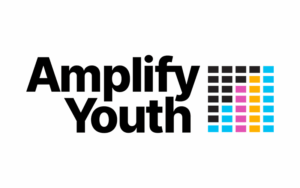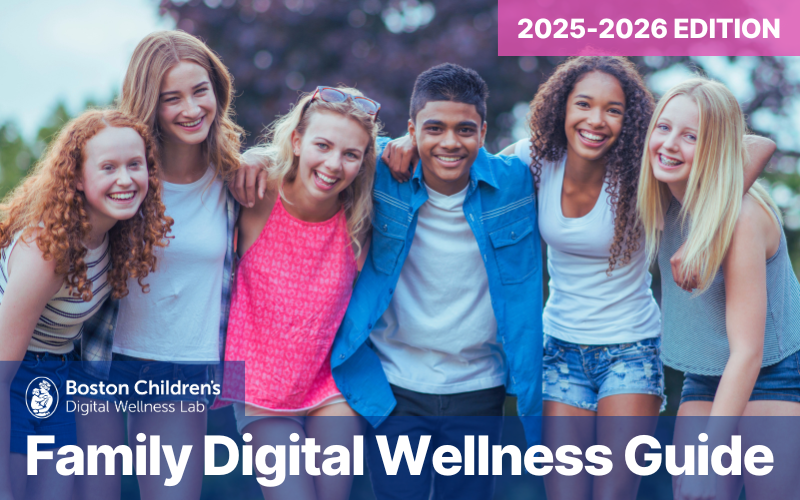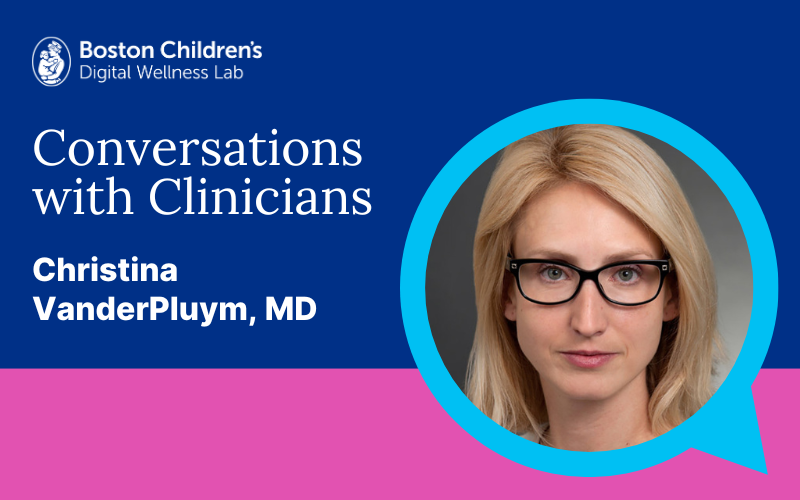Christina VanderPluym, MD
Associate Cardiologist, Department of Cardiology, Boston Children’s Hospital
Medical Co-Director, Cardiac Antithrombosis Management Program (CAMP), Boston Children’s Hospital
Medical Director, Ventricular Assist Device Program
Medical Co-Director, Stroke and Cerebrovascular Center, Boston Children’s Hospital
Associate Professor of Pediatrics, Harvard Medical School
What does a typical day look like for you?
First, I am a mom and wife before I come to work. The first thing I do in the morning is grab my kids’ iPads so I can get them breakfast and out the door. When I get to work, I might be doing rounds in the ICU, or I might be in the clinic with kids who have undergone heart transplants, or who have various forms of heart disease. I also work with many kids who are on chronic medications, specifically warfarin and another class of medications that puts them at risk of bleeding — we have to watch these kids very carefully. So, a lot of my day to day is interfacing with kids of all ages, as well as young adults, helping to manage their chronic diseases and finding ways for them not just to survive their diseases, but really thrive.
What led you to the work you do?
At a very young age, I had decided that I wanted to be in the medical field. I didn’t know exactly which one, but in high school, I met a wonderful cardiac transplant physician who motivated me to get into this field of heart transplantation. My career evolved from there as I found other heart failure problems I wanted to find solutions for. That is how I came to manage blood thinning medications or anticoagulants in kids who are developing strokes because of heart transplants or their heart disease.
What would you say are the greatest opportunities you see for kids growing up in a digitally saturated world?
Information! There is so much more information at their fingertips that can provide so much enlightenment. It’s kind of akin to when books started to be published en masse and you could go to a library and get a book on any topic. There was an entire new generation at that time that saw a wealth of information in books as the most enlightening period. In many ways, we’re now navigating a new enlightenment. I think it’s very easy to fear information in our digital era, just as people feared all of the information that was being published in books hundreds of years ago. Now we need to work to understand how to tell what’s real and what’s fake or less than truthful, and really understand where the content is coming from. We should be having conversations with our kids to help them navigate this new world of information.
What are the greatest challenges you see for kids growing up in a digitally saturated world?
As a mom and as a user of digital media, I’ve noticed the addictive nature of it. It is so easy to just sit and look at a screen for hours upon hours and get little snippets of information fed to you. There is something immediately gratifying about seeing an interesting film about a cute little dog running around a backyard or a squirrel falling off a picnic table. Things like this can really draw you in, but then you are robbed of the outside world. We have to find a way of moderating the digital world and the real world to create a balance where all of us, but especially our kids can live in both worlds safely. It’s far easier said than done!
How would you change or redesign technology and or media to be healthier for kids across the developmental span?
While sites like YouTube have kids’ versions, and many sites have child restrictions, the reality is that kids are very adept technically at going around them. And there are too many companies and individuals creating content that just skirts the appropriateness for children. I think the reality is that we need to create time limits on many of these sites and find ways for the algorithms to not feed only one interest to kids, but rather feed them a much more diverse set of information. I think the same should be true for adults. The algorithms today create a very sequestered and siloed strain of information.
I think if our kids are going to be on sites like YouTube and other types of sites where they’re going to get information, that the sites provide a wide array of information that is age appropriate. This feels really challenging, because each child is going to have different things that you consider to be age appropriate.
What guidance or advice do you have for parents and other caregivers to help kids build and maintain healthy behaviors around digital media and technology?
Parents should be talking openly with their kids about what they’re seeing and experiencing online, and not demonizing or making them feel bad about what they are doing or what they’re watching. And if we want to help them create healthy habits, we have to not just say, but do what we say ourselves. The reality is that I tell my kids constantly to get off their screens, to shut off their iPads, to put it all away. Then in the next breath, I turn to my phone to answer an email or text. What message does this send to them? As an entire culture, I think we have to be able to set aside times where our mobile devices and our screens go away, even if it’s just an hour a day during dinner or a conversation, I think that’s really important.
Additionally, I think watching some digital content together (including television and videos on YouTube or TikTok) gives you a sense of what you think is appropriate. When you know what types of things they’re being exposed to, you can provide better guidance.
Lastly, schools are doing a better job of providing kids with information on how to understand where it is coming from, to help them look at digital content and ask themselves, “Is this a fact or is this an opinion? Is this a reliable source?” Helping kids learn how to identify misinformation early, before they are on social media, will help them to navigate it more safely when they do get on.
Is there anything else you’d like to share?
None of us are experts, and the reality is that we are all trying to navigate this new world ourselves and do the best that we can. I think as long as we keep an open heart and an open mind, we’ll be able to go through this as best we can. Every generation has had to navigate different things with their children. In a way, we are lucky that we have this tremendous technology in our hands and so readily available. It’s really imperative that we go through this with our kids, and not just for our kids — for our kids to have a say in how they move through this new world, because they’re going to grow and expand in this world far beyond what we could imagine.
Here at the Lab, we welcome different viewpoints and perspectives. However, the opinions and ideas expressed here do not necessarily represent the views, research, or recommendations of the Digital Wellness Lab, Boston Children’s Hospital, or affiliates.








